Like we told in the last issue, Rainbow did first an extensive American-tour. Together with Pat Travers Rainbow was the top-of-the-bill while Saxon was the support-act. They did 45 shows between 10 March and 12 May (in 63 days that is).
The American-tour as far as we can overlook it didn't mean a definitive breakthrough for the band. The "Difficult To Cure" album didn't do better than a position between 70 and 80 in the album charts in the States, where "Down To Earth" reached no 69 in Billboard.
The American press was in general positive, while also the concerts were judged as good.
RAINBOW
LIVE IN DEUTSCHLAND
Wednesday 10 June. Half past nine. Creeking sounds of the stopping Loreley-Express on the railway station in Arnheim. Einsteigen bitten und Türe schliessen! Wir wünschen Ihnen eine gute Reise! It's quite busy in this international train. This train that will go all the way to Rome has many people who are taking their holiday. After stops in Emmerich and Wesel, I have to take in Oberhausen the S-bahn to the Essen Hauptbahnhof. It's a quarter past eleven when I arrive. I take a cab to the Park Hotel, which is next to the Grugahalle. After I had something to eat I meet Horst Fleckhaus, who follows the whole European tour, together with Brad of the English fanclub.
Horst and Brad tell me the first shows of the European tour went excellent. Three o'clock the band should arrive for the sound-check, but by no means we see anything that looks like Rainbow. The equipment is present. The roadies keep playing annoyingly the same tape (including "Highway Star") over and over again. We also do not see Ian Broad, our important contact. Half past four then finally we get the news: Def Leppard and Rainbow didn't catched their plane. They'll arrive
about half past six. Too late for doing a soundcheck. Will Ritchie, the perfectionist, play a concert without a soundcheck? The strain is backstage on everyone's face. But a quarter past seven we get the signal that the show will go on.
On eight o'clock sharp Def Leppard start their set. They play 35 minutes of material of their "On through the night" and the new "High'n'dry" album. This group is very promising but still has a lot to learn. After the pause, where we hear the known tape with good old rocksongs like "Locomotive breath" by Jethro Tull, "Sunshine of your love" by Cream, "Hey Joe" by Jimi Hendrix and "Fire" by Arthur Brown, we get to hear at half past nine the tape with "Land of hope and glory".
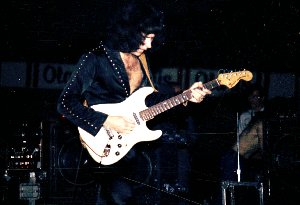 We don't get the "countdown" like last year. Judy Garland is still present with her "Over the rainbow", and then Don, Roger and Bobby (like on "On Stage") get into action. They keep it very long so the soundsmen can adjust the sound. It takes two minutes before Ritchie enters the stage on the right side, his sound is far too loud, the speakers on his side make a weird sound, which give the soundsmen some more work to do.
We don't get the "countdown" like last year. Judy Garland is still present with her "Over the rainbow", and then Don, Roger and Bobby (like on "On Stage") get into action. They keep it very long so the soundsmen can adjust the sound. It takes two minutes before Ritchie enters the stage on the right side, his sound is far too loud, the speakers on his side make a weird sound, which give the soundsmen some more work to do.
Finally Ritchie starts "Spotlight Kid" and we see Joe Lynn Turner appear on the scene. His voice is drowning in the noise. The first two verses are awful, we also can't make anything out of the solos by Don and Ritchie. It's a wall of sound. It should have been the lack of a soundcheck.
Just like on the last tour "Love's No Friend" is the second song of the show. We can now hear Joe a lot better. Ritchie does his first good solo of the night. Joe then tells it's his first time in Germany and he's glad to be here.
Don does a short classical intro for "I Surrender". Ritchie does again a solo at the end of the song, strongly bothered by a out of tune string of his guitar. Too bad. It a surprise "Man on the silver mountain" is that early in the set. Joe sings the song with a different melody line than we're used to.
It's a bit weird. Every time you wan na sing along, he sings it different. Ritchie also does a rare solo. Than Joe ask for silence and tells us "here's a song you all know". Ritchie plays the "Greensleeves" theme, accompanied by hundreds of cigaret lighters. It looks like magic. And then we get.... "Catch The Rainbow". Sung marvellous by Joe. If you close your eyes you hardly can hear any difference with the voice of Ronnie Dio. This is where Graham Bonnet failed (according to Ritchie he just couldn't do these songs), Joe succeeds. The solo by Ritchie goes terrible wrong when his Sony-tapedeck refuses. Ritchie keep this solo logically very short.
"Do you want some rock and roll" Joe ask and the packed place don't want anything else than that. "Can't Happen Here" is next. Joe has some problems to follow the tempo. He makes a few faults. And then everyone, except for Don, leaves the stage. We get a swinging, based on "Close Encounters" solo including a nice boogie-piece. In these five minutes Don shows again that he's got a lot of experience and is master over his instruments.
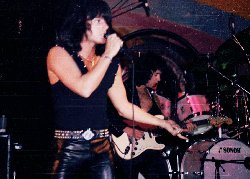 He's without a doubt the best keyboard-player Rainbow ever had. Then the whole band returns and it's Bob who gets us into "Lost In Hollywood". Now we hear the difference between Turner and Bonnet. Graham can go to the limit, while Joe can't handle this heavier stuff. "Hollywood" is made for Bonnet. Via the middle part we arrive at Beethoven's Ninth, and the audience gets really wild now. Joe Lynn Turner has picked up his Fender Silver Anniversary and plays along, altho we hardly hear him.
He's without a doubt the best keyboard-player Rainbow ever had. Then the whole band returns and it's Bob who gets us into "Lost In Hollywood". Now we hear the difference between Turner and Bonnet. Graham can go to the limit, while Joe can't handle this heavier stuff. "Hollywood" is made for Bonnet. Via the middle part we arrive at Beethoven's Ninth, and the audience gets really wild now. Joe Lynn Turner has picked up his Fender Silver Anniversary and plays along, altho we hardly hear him.
The sight is unique: Blackmore who tolerate a second guitarplayer on stage next to him. We get the full album version. In the middlepart one of Ritchie's strings get broken and he leaves smiling the stage. It looks like it's happening on purpose. We'll get the organ piece and the song is ended without Ritchie. Then it's Mr.Rondinelli's turn. So far he had a quite unnoticed (in a way of: you hardly hear any difference to Cozy) but functional role. But now it's time for his drumsolo in Rainbow.
No more Tchaikovsky's 1812th Overture, but Bobby the drumteacher on the drums. Well, technical Bob looks better than Cozy, altho I think this solo doesn't go like it should have been. His solo is not much more or less than the average drumsolo. Till the moment Bob is hurling a whole series of drumsticks into the audience.
The way he does it is very rare. He continues with his bare hands. This is something else and it sounds great. Then Bob gets a huge sort of hammer, shows it proudly to the crowd and then starts hitting the huge gong behind him. I think his solo takes a bit too long, but it's good to get finally another solo than the predictable solo of Cozy Powell.
"Long Live Rock'n'Roll" is the next thing. Ritchie returns after he's been away for at least ten minutes. Just like Dio did in the old days, Joe also does the known community-singing-game with the audience. Ofcourse it's a success. "Long Live" is like the national anthem. With a short 'goodnight' Joe and the rest of the band disappear in the dark. We hear a massive 'zugabe, zugabe' and it takes not too long. Ritchie hits the stage again and starts "Vielleicht das nachster Zeit", but starts playing halfway through the chords of "All Night Long". Again I notice that Joe has problems handling a typical Bonnet-song.
In the end Joe and Ritchie start a guitar-voice duel (remember "Strange Kind Of Woman"). It's great. The group leaves again the scene. A little while later we hear the "Lazy" intro. Just like in the last years it's a short piece, then Ritchie plays "Woman From Tokyo"!! I'm amazed. We also do not get more than the intro and Ritchie which is followed by the intro of "Smoke On The Water". On the moment I think it'll be only the intro, it turns out the whole song is going to be done. Smoke gets on the stage and Joe sings about "the recording of Machine Head".
The audience goes crazy. And then again it gets dark. The suspense moves upwards. Will Rainbow return for a third time? And yes, here they are, Ritchie again returns first. The whole show he has played on a snow white Fender, anyone who's near enough the stage can notice he changed that for an imitation now. We all know what this means. Together with Roger, Bob and Don they start an instrumental in which we hear the solo of "Kill The King". And then it's time for smashing up the guitar. After this demolishing act he picks up his Fender and we get a short reprise of "Long Live".
Three encores we got, hardly anybody asks for more now. It get's dark and we hear Judy Garland's "Somewhere over the rainbow". The first ones leave the hall and I decide to go backstage. I'm just behind the stage when Bobby Rondinelli passes me, he's climbing behind his drumkit again. I can't imagine that there'll be another encore so I assume that Bob has forgotten something. But then I see also Roger and Ritchie go to the stage and I know this is serious. I get back to the hall very fast. It's a strange sight: the hall is half empty, Rainbow returns on stage!
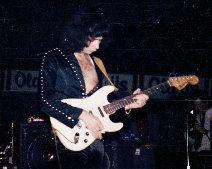 In a high tempo we get the old Jimi Hendrix song "Fire". People get back into the hall and just when most people are returned in the hall the short song is already over. Surprised faces all around. Not many people know what's going on. Was this another typical Blackmore-joke? The lights in the hall go on and the show is definitive over. It's ten to eleven.
In a high tempo we get the old Jimi Hendrix song "Fire". People get back into the hall and just when most people are returned in the hall the short song is already over. Surprised faces all around. Not many people know what's going on. Was this another typical Blackmore-joke? The lights in the hall go on and the show is definitive over. It's ten to eleven.
Colin Hart is very busy arranging everything and tells me to wait for a sign before I can go in the direction of the dressingrooms. The waiting takes a long time. Finally Ian Broad gives the sign that we're welcome.
Ritchie is ready to leave, he's not in the mood to talk but agrees to talk with me in Rotterdam. Roger, Joe, Don and Bob are still busy with the autograph-hunters. Finally I can talk with Don.
Don, last year you were talkin' about a solo-album. How about it?
Don: I've been very busy the last year. I don't have had time for that record. I did quite some studio-work; Michael Schenker's first LP, Ozzy Osbourne and you can hear me on Cozy's second album. Cozy is still a good friend of mine. Then we went into the studio to record "Difficult To Cure" and my part was much bigger than on "Down To Earth". Ritchie was very down and sometimes he almost was thinking of giving in. But Roger helped us through these bad moments, but to get back to your question; this world tour will end in September. Then we're two months off and I could use that time for realizing my solo-project.
I'm very curious of what to expect. Can you tell me something about it?
Don: Well, I wrote all kinda loose things, very diverge material. The definitive result will arise in the studio. It will be varied tho.
Who will play on it?
Don: I asked a lot of old friends, but nobody made a definitive promise so far. I hope Cozy will be there and if Jaco Pastorius will play bass my dream has come true.
Roger joins us and gives us something to drink (it's awful: a mix with orange juice). He looks exhausted and seems to tired to talk.
You look tired, Roger.
Roger: Yes, it was a tiring day. We missed the plane, had to wait very long and got on top of that a long car ride. It's no fun
And then he walks away. Joe also joins a minute. He looks remarkably cheerful. His dark skin is in contrast with his white t-shirt. He's as little as Ronnie Dio.
You look happy, Joe
Joe: I am. This is my first time in Europe and I love every minute of it. It's all a lot more small and intimate than in the States.
How did you joined the band?
Joe: Totally unexpected. It seems Ritchie was keeping his eye on me for a while. One night I got a call and I was in the band.
Bob: (who in the mean time also joined us) Yeah, he's happy like a lil' kid.
Yes, you got time to become accustomed. You already was involved in the band when Cozy was still present.
Bob: That's not the truth. The only Rainbow show I saw was the Monsters of Rock-festival. But you're right that I got in touch with Ritchie before that festival.
Bob, a few days after that festival I was in London. The day after the party in Holiday Inn I did an interview with Graham Bonnet. Shortly afterwards you all left for Copenhagen. I had the impression that he didn't knew then that he was going to be fired soon.
Bob: Yes, that's right. But Ritchie was not very satisfied with Graham but didn't wanna take the risk to go into the studio without a singer. He had Joe in mind, because he liked him very much on Fandango's "One Night Stand" because his voice was close to Paul Rodgers. But on that moment it wasn't clear whether Joe was going to join us, so that's why Graham came with us to Copenhagen.
To get fired and left as a disheartened person!
Bob: Well, if you wanna put it like that, yes.
(to Joe) Bob just named Fandango. Can you tell me more about that?
Joe: The records only were released in the States and Canada. Indeed "One Night Stand" is the most known album. It's no hardrock like Rainbow but I can't deny it was good rock'n'roll. I played also guitar, together with the lead-guitarplayer Rick Blakemore i wrote most of the songs.
You now also play the guitar, still only one song, but do you think that might be expanded in the future?
Joe: Only time will tell.
Then it's Colin Hart who gives the signal that they're leaving. They have to undergo a long car ride from Essen to Cologne, where the stays in the Intercontinental Hotel. Unfortunately is this distance too far (and too expensive) to do by cab. I say goodbye to Roger, Bob, Joe and Don, wish them good luck and hope to see them again in Rotterdam.
Gerrit
This review was written on 11 June. Even before the Ahoy-concert. So I could write a review without being influenced by the Rotterdam show.
INFO STAND
We get a lot of mail. Fine! There are many questions. Fine! Some questions are interesting enough to print, ofcourse with an answer. This new section is called "INFO-STAND".
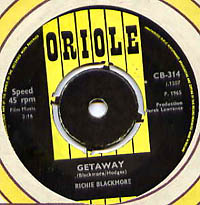 Can you tell me something more about the solo-single of Ritchie, "Get Away", in 1965
Can you tell me something more about the solo-single of Ritchie, "Get Away", in 1965
Ritchie indeed recorded in 1965 a solo-single with that title. The single was released in April 1965 on the Oriole-label and had on the b-side "Little Brown Jug". The cataloguenumber was CB 314. Producer was Derek Lawrence, also known from the first Purple-albums. On this record it's Ritchie accompanied by Carlo Little (drums - he played with Ritchie in Lord Sutch), Nicky Hopkins (piano - he also played with Ritchie in Lord Sutch) and Cliff Barton (bas). We don't know anyone who has heard this record. According to one of the most fanatic collectors of sixties music, Bert Bossink (The Fabulous Sounds of the Sixties), he's already lookin' ten years for this record.
Is Ritchie also playing acoustic guitar?
Yes, but never on stage.
What was Ritchie's first band?
On his sixteenth he joined Peter Jay and the Jaywalkers, after he was turned down in May 1961 by Lord Sutch's Savages. He was turned down because he didn't had enough experience. Still, one year later Ritchie joined The Savages after all.
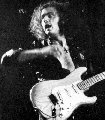 Do you know any birth dates of the Rainbowmembers?
Do you know any birth dates of the Rainbowmembers?
For this line-up they are:
Ritchie - born on 14 April 1945
Roger - born on 30 November 1945
Don - born on 21 June 1950
Joe Lynn - born on 2 August 1951
Bob - born on 27 July 1955
How did Ritchie found Jimmy Bain?
We only can guess. Jimmy played before in Harlot together with Mick Dyche (guitar), Mike Japp (guitar) and Ricky Munro (drums). Ricky Munro is an old friend of Ritchie. they both played in Mandrake Root, Ritchie formed this group around September/October 1967 when he was in Hamburg. Probably it was Ricky who attended Ritchie on Jimmy. Like we know Jimmy now has his own band Wild Horses.
In which band is Tony Carey nowadays?
The last news is one and a half year old. Tony then was in Germany. He's a guestmusician on the first album of EINSTEIN "First Principles" (WEA). This group played as support-act for Rainbow in Germany last year.
WHITESNAKE
ARROGANCE DOMINATES - VERY POOR SOUND
DE VEREENIGING, NIJMEGEN 15 APRIL 1981
In a good mood, with nice weather, I went Wednesday 15 april in the afternoon to Nijmegen so I was in time for the soundcheck of Whitesnake and hopefully it would give me a chance to talk to the members for an interview. However, the doors remained closed for everyone who was directly involved with the band. MOJO-promoter Wim Veneman couldn't also change that.
According to the news RIOT should be the support-act, then it said the French TRUST would do it. Early April another change: SLADE, again not, it was going to be PRAYING MANTIS. Final result: no support-act. At eight I was talking to Wim Veneman. He was no longer in a good mood. Wim: "This group is unmanageable. They think they're world-famous. They claim the most crazy demands, don't wanna talk to any outsiders. Even the people of EMI are not allowed. I wish they would leave right away. I never met such an idiots."
THE CONCERT
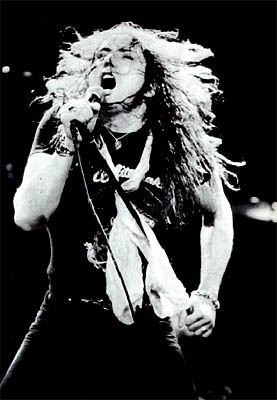 The place was not completely sold-out, they six members of Whitesnake took the stage just before nine o'clock and started surprisingly with "Walking in the shadows of the blues". De almost traditional opening "Come on" was no longer the start of the set. In a fast tempo the set was done. New songs were received very well by the audience. And old songs were sung completely by the audience. "Mistreated" got a new intro, while Bernie did a different solo.
The place was not completely sold-out, they six members of Whitesnake took the stage just before nine o'clock and started surprisingly with "Walking in the shadows of the blues". De almost traditional opening "Come on" was no longer the start of the set. In a fast tempo the set was done. New songs were received very well by the audience. And old songs were sung completely by the audience. "Mistreated" got a new intro, while Bernie did a different solo.
The instrumental "Belgian Tom's Hattrick" took over 15 minutes, we got many solos by Jon, Ian, Bernie and Micky. The drumsolo of Ian Paice was the least attractive of them. Some other songs they did were: "Don't break my heart again", "Lovehunter" and "Till the day I die". The encore was "Wine women and song", introduced by Jon Lord on piano.
This concert was mainly screwed up by the very poor sound. You hardly could hear the difference between the keyboards and guitars, while we especially heard Ian Paice's bangin' bassdrum. The whole show was very disappointing. There's not much positive to tell about this concert. And in the end we can't be dissatisfied if you know what tricks David and Co had for the fans in Borgerhout Belgium on 18 April, after the concert on 16 April in Sittard Holland already got cancelled. Our Belgian college Marc Brans tells it in his own words
WHAT HAPPENED IN BELGIUM
Marc Brans: "The promoter told us the group was already on 16 April in their hotel in Belgium. We phoned the hotel several times that day, but they couldn't trace John Ward, the tourmanager. Then the promoter told the group was not to arrive before the 18th. EMI told they got a telex from London, that said the band was doing only interviews after the show in the hotel.
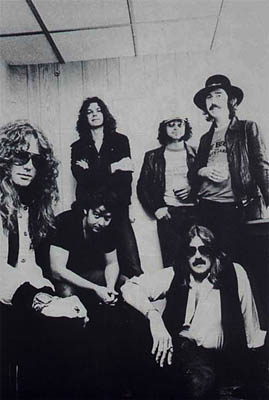 I went to the hotel early that day to see what was going on. In the hotel they told us the band showed up the day before but they also already had left. We supposed the band should return but the hotel staff denied that.
I went to the hotel early that day to see what was going on. In the hotel they told us the band showed up the day before but they also already had left. We supposed the band should return but the hotel staff denied that.
Then we left for the venue, zaal Roma. There were no posters for the show. In a pub we phoned the ticketbox of the venue and got the message that the show was cancelled. No reason was given. They were not too happy with Whitesnake either.
At half past six there were quite some fans before the venue. On a sign before the venue was an announcement written that the show was cancelled. We heard the band complained about the size of the stage. Personnel of the venue had been busy all night to change what was requested and succeeded. At nine that morning the Whitesnake crew was supposed to set up the equipment, but at ten there was still nobody. Then they got a phonecall that the band had left the hotel and the show was cancelled that night. Whitesnake apparently could permit themselves do to this without giving a reason.
Most likely the ex-Purple, who used to play for 10.000 people or more, felt too good to play for only 1000 fans, even there were no more than 1100 fans in Nijmegen. There were now many fans who travelled 300 km and more for nothing."
That's what Marc experienced. We did undergo ourselves the weird way Whitesnake is acting in Nijmegen. It's not that long ago that David Coverdale was telling how good it was to play for small audiences and to talk with the fans afterwards. Now this band think they're superstars and there's no room for the ordinary fans. Well Marc, don't mourn, you didn't get anything but you also haven't missed anything. Hopefully Blackmore is on 13 June (Rotterdam) and 19 June (Brussels) in the same good mood as last year.
Gerrit
RONNIE JAMES DIO
EXCLUSIVE FOR THE FANCLAN
It seems I'm every year at the right time in the right place when I'm visiting England. In 1979 I was at the first three live shows from the (then) just new Gillan band in the Marquee Club in London, where I bumped into Bob Daisley on the last night and had a chat with him. Last year I was a few days after the Monsters of Rock-festival in de Marquee to see a show by Girl, and Ritchie Blackmore joined them on stage in the encore to play "Born to be wild" and I ended on a party with the gentlemen Blackmore en Glover. Last August I'm again in the Marquee, Girl plays again the venue and I bump into Ronnie James Dio. It seemed he stayed in the same hotel as I and we made an appointment to see each other in the hotel-bar at midnight.
It's about a quarter to twelve when the small man with the big voice walks in, after he ordered two drinks, he sat down next to me. I told him in the Marquee that I came from Holland and was running the Rainbow Fanclan and that everyone overhere was interested how he was doing (isn't that right?). Ronnie couldn't remember we talked with each other already twice before, well, that was a long time ago.
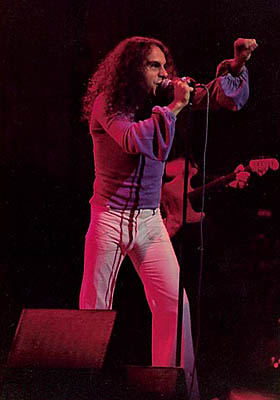 What is the reason for your stay in England?
What is the reason for your stay in England?
RD: We are preparing the campaign for the new album together with the promotors. That album should be in the shops late September, if everything goes well.
Can you tell something about the new album?
RD: We not sure about the title. We have four opportunities, but it depends on the coverart. We can choose from four designs. Musically you can count on a continuation of "Heaven and Hell".
The biggest change will be ofcourse the drums. Like you know Bill Ward has left the group some time ago and is replaced by Vinnie Appice, he's the younger brother of Carmine. His drums are as heavy as those of Bill, but he plays with a different beat.
Are you going to use keyboards again?
RD: Yes, on a couple of a songs.
Did you ever consider to get a permanent keyboardplayer to play at your concerts? I think sometimes you get gaps when Tony does his solos.
RD: I personally gave my opinion to the other in the band. After all I have years of experience with keyboardplayers. But the others, especially Geezer, don't like the idea.
"Heaven and Hell" is received very well by the Sabbath-fans. A reporter in Holland (Kees Baars) reviewed the record as 50% Sabbath and 50% Rainbow.
RD: That is a compliment for me, in that way that it suggests that I was half of Rainbow and now I'm half Black Sabbath. Anyway that's not true.
Still you can't deny you took a lot of experience from Rainbow into Sabbath. For example in "Lonely is the word" the synthesizer-part reminds me strongly to "Catch the Rainbow" and for Sabbath standards "Neon Knights" has a fierceness and also the break in the middle evoke a picture of Rainbow ("Kill the King").
RD: I must admit that those songs were my idea. Maybe you're right. You know, these kinda songs happen on a certain moment, spontaneously, and you're not thinking then: this I got of Blackmore and that's what I'm gonna use.
Two weeks ago (1 August) Sabbath was announced to play the Heavy Metal Holocaust as the headliner together with Motorhead. The show was cancelled at the last minute and you were replaced by no one else than Ozzy Osbourne. Didn't you want to play because you had to play before Motorhead?
RD: No way, we're much better (laughs). No, it wasn't like that. We were in the middle of the final mix for the album and that's a very precise job, we didn't want to interrupt that.
Ronnie, it's almost four year ago since the last time we spoke. That was in October 1977 in The Hague. You were then very positive about Rainbow. Shortly after the release of "Long Live Rock'n'Roll" you were gone. What happened?
RD: "Long Live" was a hell. Before that worldtour Cozy, Ritchie and I recorded a few tracks. After the tour was done we'd to finish the record. We then had David Stone and Bob Daisley in the band. But Ritchie was the problem. He was absent quite a lot. We were in some old castle in France. Ritchie was sometimes for days in the small room in the spire and didn't showed himself a minute while we were workin' our fingers to the bone with the basic tracks.
How is it possible that you left so short after the release of that album?
RD: On a certain moment Bruce (Payne - manager of Rainbow) told me I was not wanted any longer. Especially Bruce, with whom I worked for years, told me that. Because I didn't believe him right away, I phoned Cozy. He told me he felt sorry for me, but that's the way. Then when I heard shortly afterwards that also David and Bob got fired, I knew definitely that Blackmore was in the grasped by the devil.
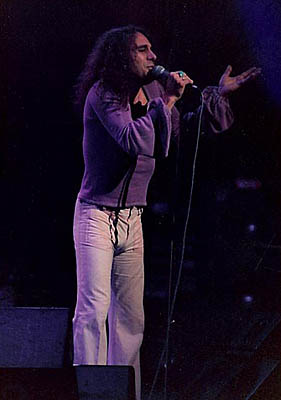 What did you do then?
What did you do then?
RD: I started thinking. I could do two things: either start a new band so start at the end of the ladder, so I was back where I was years ago, or I should join a known band. Initially I was start up something together with Bob Daisley, but it didn't worked out.
So it became Black Sabbath. And Ritchie continued with a new Rainbow. Did you followed the band since you left?
RD: Not emphatically. I listened to "Down To Earth". With the arrival of Roger Rainbow now sounds like an average rockband. The magical charisma is gone. I saw they a few months ago in L.A. and found out they now have again another singer. I think he was not too bad, but the whole repertoire lean on the old successes. I don't know what's going on in Ritchie's head to start playing "Smoke on the water" again, he shouldn't have tried that when I was in the band.
i agree. A difference with your time in Rainbow is, they have now more commercial success. What's the reason for that?
RD: I think about two reasons. Firstly Ritchie realised that it's no use to release very long solos on his records. I still think "Stargazer" and "Catch the Rainbow" are marvellous songs, but on records they are too long to guarantee commercial success. And I know like nobody else that Ritchie deep down in his heart doesn't want anything else than exceed Deep Purple. And secondly Ritchie, most likely under the influence of Roger, started to compose songs in a different way. It's impossible that we should have done a song like "All night long" five years ago.
After you left Rainbow have you thought about reforming your old band ELF?
RD: Not really, no. Still I tried to find out where everyone has been. Don't forget we were together for years for better or worse. When Ritchie took over the band, we got the feelin' that we made it. It was sort of a recognition. But Ritchie had too high demands so the others couldn't handle it any longer and disappeared. Mickey Lee Soule and Mark Nauseef are still active, but they change bands all the time.
What are your future plans?
RD: the new album id the most important right now, it should be out late September. We'll do first an American tour. I also have some ideas for a solo-album. Hopefully I have time for that during the winter.
Can you tell me something about those ideas already?
RD: I have got a few things, that don't fit the in Sabbath, but I still love those things. A few eastern-oriented style things and a bit of romance.
Who will play on it?
RD: Like I just said, I tried to find out what happened to my old pals from ELF. I'll certainly ask them if I find them. Geezer and Toni already promised to play on it. And, despite everything, I like to have Ritchie on it because he's good with eastern style ideas. He's a masters if it comes to rare scales. Musically I don't have any differences of opinion with him.
Is there a possibility that Sabbath will play Holland?
RD: We will do an European tour. If Holland is interested in Sabbath we certainly will play there.
If it's up to the fans, then it won't be a problem.
Ronnie and I stayed for a while in the bar. It was half past two and that meant the known 'the bar is closed'. Still it was a very good experience to have talked to Ronnie again. In Muziekkrant Oor recently there was an interview with Ronnie by Kees Baars. A few things they talked about he also told me. In the Oor interview he explained that he still had a lot of debts to Rainbow. 'How about that?'
I was asked by many members by mail the last few weeks. There are stories that everyone in Rainbow is being on the payroll of the group. Everyone gets a certain amount. Secondly everyone who joins Rainbow KNOW, they have to contribute towards the sound-equipment. I can't tell about what kind of amounts we're talking. Blackmore has been for twenty years working hard in the musicbizz, and besides a brilliant guitarplayer he'll be ofcourse also a merciless businessman by now.
END PART 1 (Double issue Over The Rainbow en zo 9 & 10)
© Rainbow Fanclan 1979-1984
|


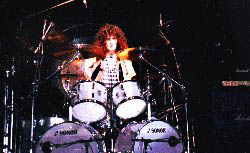 Bob is the youngest member of the band. He's born on 27 July 1955 in Brooklyn, New York. He got brown eyes, black curly hair and is about 1.70 meter long. He used to play before in a group called 'Samantha'. We don't know if this group released any records. His first group was a year after he started drumming. At the age of 12 he played in a band called TUSK. You can conclude from his name that Bob is from Italian origin. His favorite food is not
surprisingly Italian.
Bob is the youngest member of the band. He's born on 27 July 1955 in Brooklyn, New York. He got brown eyes, black curly hair and is about 1.70 meter long. He used to play before in a group called 'Samantha'. We don't know if this group released any records. His first group was a year after he started drumming. At the age of 12 he played in a band called TUSK. You can conclude from his name that Bob is from Italian origin. His favorite food is not
surprisingly Italian.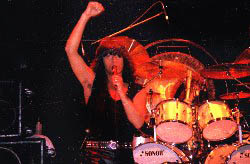 Joe was born on 2 August 1951 in New Jersey. He's about 1.68 meter long, brown eyes and brown hair. Ritchie describes him as a combination between Lou Gramm and Paul Rodgers. In appearance and built he looks a bit like Ronnie Dio. We don't know that much about his musical career so far. The European tour of Rainbow will be his first acquaintance with Europe.
Joe was born on 2 August 1951 in New Jersey. He's about 1.68 meter long, brown eyes and brown hair. Ritchie describes him as a combination between Lou Gramm and Paul Rodgers. In appearance and built he looks a bit like Ronnie Dio. We don't know that much about his musical career so far. The European tour of Rainbow will be his first acquaintance with Europe. We don't get the "countdown" like last year. Judy Garland is still present with her "Over the rainbow", and then Don, Roger and Bobby (like on "On Stage") get into action. They keep it very long so the soundsmen can adjust the sound. It takes two minutes before Ritchie enters the stage on the right side, his sound is far too loud, the speakers on his side make a weird sound, which give the soundsmen some more work to do.
We don't get the "countdown" like last year. Judy Garland is still present with her "Over the rainbow", and then Don, Roger and Bobby (like on "On Stage") get into action. They keep it very long so the soundsmen can adjust the sound. It takes two minutes before Ritchie enters the stage on the right side, his sound is far too loud, the speakers on his side make a weird sound, which give the soundsmen some more work to do. He's without a doubt the best keyboard-player Rainbow ever had. Then the whole band returns and it's Bob who gets us into "Lost In Hollywood". Now we hear the difference between Turner and Bonnet. Graham can go to the limit, while Joe can't handle this heavier stuff. "Hollywood" is made for Bonnet. Via the middle part we arrive at Beethoven's Ninth, and the audience gets really wild now. Joe Lynn Turner has picked up his Fender Silver Anniversary and plays along, altho we hardly hear him.
He's without a doubt the best keyboard-player Rainbow ever had. Then the whole band returns and it's Bob who gets us into "Lost In Hollywood". Now we hear the difference between Turner and Bonnet. Graham can go to the limit, while Joe can't handle this heavier stuff. "Hollywood" is made for Bonnet. Via the middle part we arrive at Beethoven's Ninth, and the audience gets really wild now. Joe Lynn Turner has picked up his Fender Silver Anniversary and plays along, altho we hardly hear him. In a high tempo we get the old Jimi Hendrix song "Fire". People get back into the hall and just when most people are returned in the hall the short song is already over. Surprised faces all around. Not many people know what's going on. Was this another typical Blackmore-joke? The lights in the hall go on and the show is definitive over. It's ten to eleven.
In a high tempo we get the old Jimi Hendrix song "Fire". People get back into the hall and just when most people are returned in the hall the short song is already over. Surprised faces all around. Not many people know what's going on. Was this another typical Blackmore-joke? The lights in the hall go on and the show is definitive over. It's ten to eleven. Can you tell me something more about the solo-single of Ritchie, "Get Away", in 1965
Can you tell me something more about the solo-single of Ritchie, "Get Away", in 1965 Do you know any birth dates of the Rainbowmembers?
Do you know any birth dates of the Rainbowmembers? The place was not completely sold-out, they six members of Whitesnake took the stage just before nine o'clock and started surprisingly with "Walking in the shadows of the blues". De almost traditional opening "Come on" was no longer the start of the set. In a fast tempo the set was done. New songs were received very well by the audience. And old songs were sung completely by the audience. "Mistreated" got a new intro, while Bernie did a different solo.
The place was not completely sold-out, they six members of Whitesnake took the stage just before nine o'clock and started surprisingly with "Walking in the shadows of the blues". De almost traditional opening "Come on" was no longer the start of the set. In a fast tempo the set was done. New songs were received very well by the audience. And old songs were sung completely by the audience. "Mistreated" got a new intro, while Bernie did a different solo. I went to the hotel early that day to see what was going on. In the hotel they told us the band showed up the day before but they also already had left. We supposed the band should return but the hotel staff denied that.
I went to the hotel early that day to see what was going on. In the hotel they told us the band showed up the day before but they also already had left. We supposed the band should return but the hotel staff denied that. What is the reason for your stay in England?
What is the reason for your stay in England? What did you do then?
What did you do then?